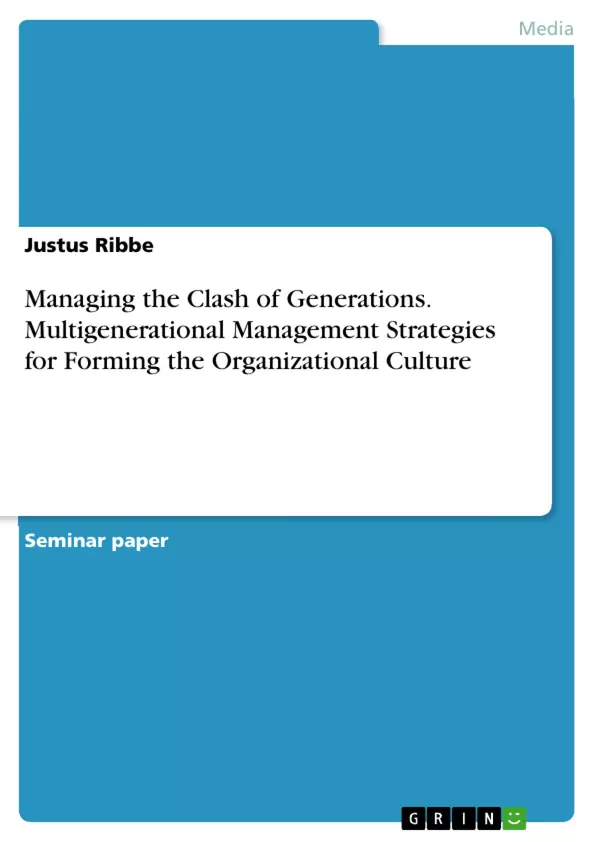In the age of the demographic change, it is imperative that companies adapt to current circumstances. The organizational culture is a topic of interests in all industries and has become an essential term in business. The central theme of age diversity in organizations is increasingly getting more attention by both practitioners and scientists. The reason for this is that more and more organizations are facing high age differences due to the demographic change. This concerns especially the generations X and Y that are currently working side by side in today’s economy. Each generation has its particularities, unique values, as well as different culture and behavior. A new generation of employees with new expectations and desires prevails in the workplace. In comparison to the generation X, the generation Y is changing cultural values. Given that generation X works closely with generation Y, the present seminar paper investigates generational differences and examines the thesis statement that the multigenerational management forms the organizational culture. As many members of generation Y are already in the workforce, executives will likely be forced to address generational differences and must deal with their unique needs.
The focus of this investigation is the multigenerational management. The effective use of gender and ethnic diversity initiatives can increase the productivity and efficiency of an organization. In addition, recognizing and preparing for specific generational differences is beneficial for the work organization. What is the best way to handle these different generations?
Inhaltsverzeichnis (Table of Contents)
- Strategies of a multigenerational management for forming the Organizational Culture
- Literature Review
- Organizational Culture
- Generational differences
- Generation X in workplace
- Generation Y in workplace
- Findings
- Benefits of a multigenerational workforce
- Managing a multigenerational workforce
- Discussion
Zielsetzung und Themenschwerpunkte (Objectives and Key Themes)
This seminar paper investigates generational differences between Generation X and Generation Y in the workplace and explores the thesis statement that multigenerational management shapes the organizational culture. It examines the impact of demographic change on companies and the importance of adapting to current circumstances. The paper also investigates how the effective use of diversity initiatives, including age, gender, and ethnicity, can enhance an organization's productivity and efficiency.
- The role of organizational culture in fostering success and profitability.
- The unique characteristics, values, and behaviors of Generation X and Generation Y.
- The benefits of a multigenerational workforce for organizational growth and development.
- Strategies for managing a multigenerational workforce, including accommodating differences, creating workplace choices, operating with sophisticated management, respecting competencies, and nourishing employee retention.
- The impact of generational differences on communication, collaboration, and decision-making within organizations.
Zusammenfassung der Kapitel (Chapter Summaries)
The first chapter defines organizational culture and highlights the significance of its impact on various aspects of business operations. It then delves into generational differences, specifically focusing on Generation X and Generation Y, outlining their unique characteristics, values, and behaviors in the workplace.
The second chapter explores the findings regarding the benefits of a multigenerational workforce. It emphasizes the advantages of diversity in terms of recruitment, retention, productivity, and profitability. The chapter also presents management strategies for effectively handling a multigenerational team, addressing the importance of understanding each generation's unique strengths and weaknesses.
The third chapter delves into the discussion of managing a multigenerational workforce, highlighting the challenges and opportunities of creating a harmonious work environment where diverse generations can thrive. The chapter explores the importance of communication, collaboration, and mutual understanding between generations, emphasizing the need for organizations to adapt their approaches to cater to the needs of a multigenerational workforce.
Schlüsselwörter (Keywords)
The primary keywords and focal points of this work include organizational culture, multigenerational management, generational differences, Generation X, Generation Y, demographic change, diversity, workplace dynamics, communication styles, team building, and employee engagement. The paper explores how these factors interact to shape the organizational culture and the challenges and opportunities presented by a multigenerational workforce.
What are the main differences between Generation X and Generation Y in the workplace?
Generation X and Y have unique values and behaviors; for example, Gen Y often seeks more cultural flexibility and has different expectations regarding technology and communication compared to Gen X.
How does multigenerational management affect organizational culture?
Effective management of different age groups helps shape a diverse and inclusive organizational culture, which can lead to higher productivity and employee retention.
What are the benefits of a multigenerational workforce?
Diversity in age brings a mix of experience and new perspectives, fostering innovation and better problem-solving within the company.
What strategies can executives use to manage age diversity?
Strategies include respecting different competencies, creating flexible workplace choices, and focusing on sophisticated communication styles to bridge generational gaps.
Why is demographic change a critical issue for modern companies?
As the workforce ages, companies must adapt to the unique needs of younger generations to remain competitive and ensure long-term organizational success.



